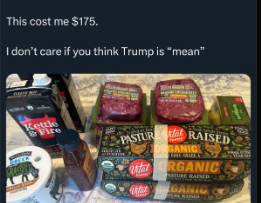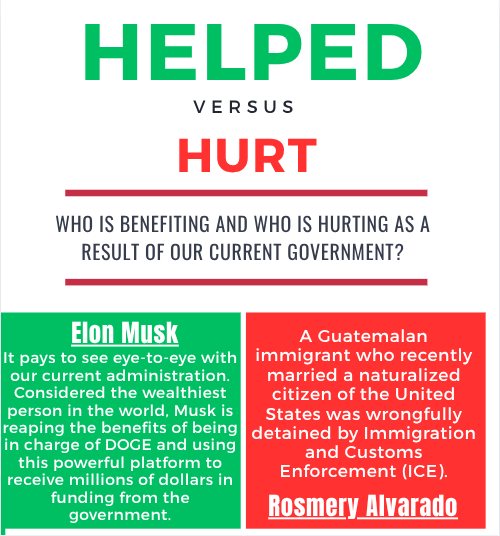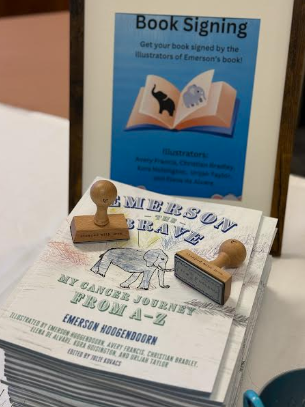The Atlantic headline said Vice President Kamala Harris “may need to steal” the elections to save Democracy.
The headline was fabricated. The Atlantic said in a statement that the screenshot was the latest in a series of fake Atlantic headlines, some of them using hateful language.
A time of drama, propaganda, and politicians blaming each other. Not everyone wants to inform. Some individuals and sometimes organizations will try to brainwash your mind with fake and unbiased news. They are waiting like a snake for its prey, to swallow your way of thinking and hone it into what is profitable for them. Not everything you see is true, not everything you hear is real, and not everyone you hear from wants to inform you.
“Unfortunately, people believe what they hear/read that’s fake news. This leads to misinformation and sometimes hysteria. A good example of this is the claim made by JD Vance that the Haitian immigrants in Springfield, Ohio are eating cats and dogs. That was a completely made-up story,” Instructor Shanon Witvoet said.
Fake celebrity endorsements
Fake celebrity endorsements have become one of the most powerful weapons for propaganda. Since celebrities are very popular, internet trollers use this opportunity to publicize their fake news by featuring them.

 An example is when earlier in September, pictures of actor Ryan Reynolds wearing a shirt to endorse Vice President Kamala Harris were published on social media. The image was edited.
An example is when earlier in September, pictures of actor Ryan Reynolds wearing a shirt to endorse Vice President Kamala Harris were published on social media. The image was edited.
Earlier this summer pictures of Taylor Swift endorsing former President Donald Trump while holding a flag saying “Trump won” is another good example of fake celebrity endorsements. AI-made videos were published featuring Taylor Swift talking about her support for Trump.
Social media effect on spreading false information
“I read something on Twitter/X that shocked me. I can’t remember exactly what it was, but I then looked on a few media websites, I think CNN and New York Times for more information, but I couldn’t find anything. I then conducted a Google search and after about 20 minutes of searching and reading, I found out that it was a fake story being spread through Twitter/X,” Witvoet said.
A lot of fake news looks like people are furious at the government for the outcome of their actions. Sometimes both the actions and the outcomes can be fake.
 This is an example of a user who blames the government, claiming that her groceries cost her $175. Another user who appeared to have calculated their real cost says that it only costs $119. This is an example of people exaggerating the price of their groceries on social media to give a false example of why others should vote for who they are voting for. It is a great example to show how a lot of posts out there publish information with intention or not, that mislead the readers.
This is an example of a user who blames the government, claiming that her groceries cost her $175. Another user who appeared to have calculated their real cost says that it only costs $119. This is an example of people exaggerating the price of their groceries on social media to give a false example of why others should vote for who they are voting for. It is a great example to show how a lot of posts out there publish information with intention or not, that mislead the readers.
 Another example of false information published on social media is that Florida Governor Ron DeSantis said Dominion voting systems will not operate in Florida. After the 2020 election, Dominion Voting Systems was the target of baseless conspiracy theories. These voting machines, allow voters to cast their votes electronically, and optical scanning devices are used to tabulate paper ballots. The Florida Department of State approved using Dominion equipment, which will be used in 18 counties.
Another example of false information published on social media is that Florida Governor Ron DeSantis said Dominion voting systems will not operate in Florida. After the 2020 election, Dominion Voting Systems was the target of baseless conspiracy theories. These voting machines, allow voters to cast their votes electronically, and optical scanning devices are used to tabulate paper ballots. The Florida Department of State approved using Dominion equipment, which will be used in 18 counties.
Social media plays a key role in spreading misinformation. One reason is that everyone can post anything they want without having to prove the source of their information. Another reason is that users read the information without filtering it for misleading or false information.
How to find out the legibility of information we see online
“When I read something or hear something I always double-check to see if other sources are reporting on the same topic. If I’m only finding the information in one location/from one media source, then I know it’s not true. Also, it’s a good idea to know what media is biased and what is unbiased. I love to read AP and Reuters because they are straightforward with facts and minimal bias. I steer clear of blogs and opinions. If my source is something like Fox News, then I try to find a Vox story on the same topic so I have both far right and far left accounts,” Witvoet said.
Before getting angry at an article, consider fact-checking it first. We encourage you to look out for these 4 factors in news media:
- The Publisher
There are many news channels out there, but not all of them can be trusted. Don’t believe information from unknown sources. Chances are, they are fake.
- How old is the media company
The age of the news media company matters. Fake news or troll companies don’t usually last long.
- Who funds them
Funding can be a big deal. Whoever gives them the money has a purpose, to shape the information they publish. So if they get funded by a big businessman or a politician it’s better to stay away from them.
- Their history and allegations
There are a certain amount of news media companies out there that have big controversies in their history. This is fake news, corruption, or biased news.
Some websites and companies can help you find the legitimacy of news. Here are two of them:
- FactCheck.org is the website to look for. It debunks fake news posted by different media companies and on social media.
- Ground News is another good media company to look at. They publish every news linking it to other articles posting about it and defining which political side it leans to.








Eriola • Nov 4, 2024 at 11:49 am
Interesting ending, the fact-checking or double-checking before coming into conclusion. Thank you for sharing.